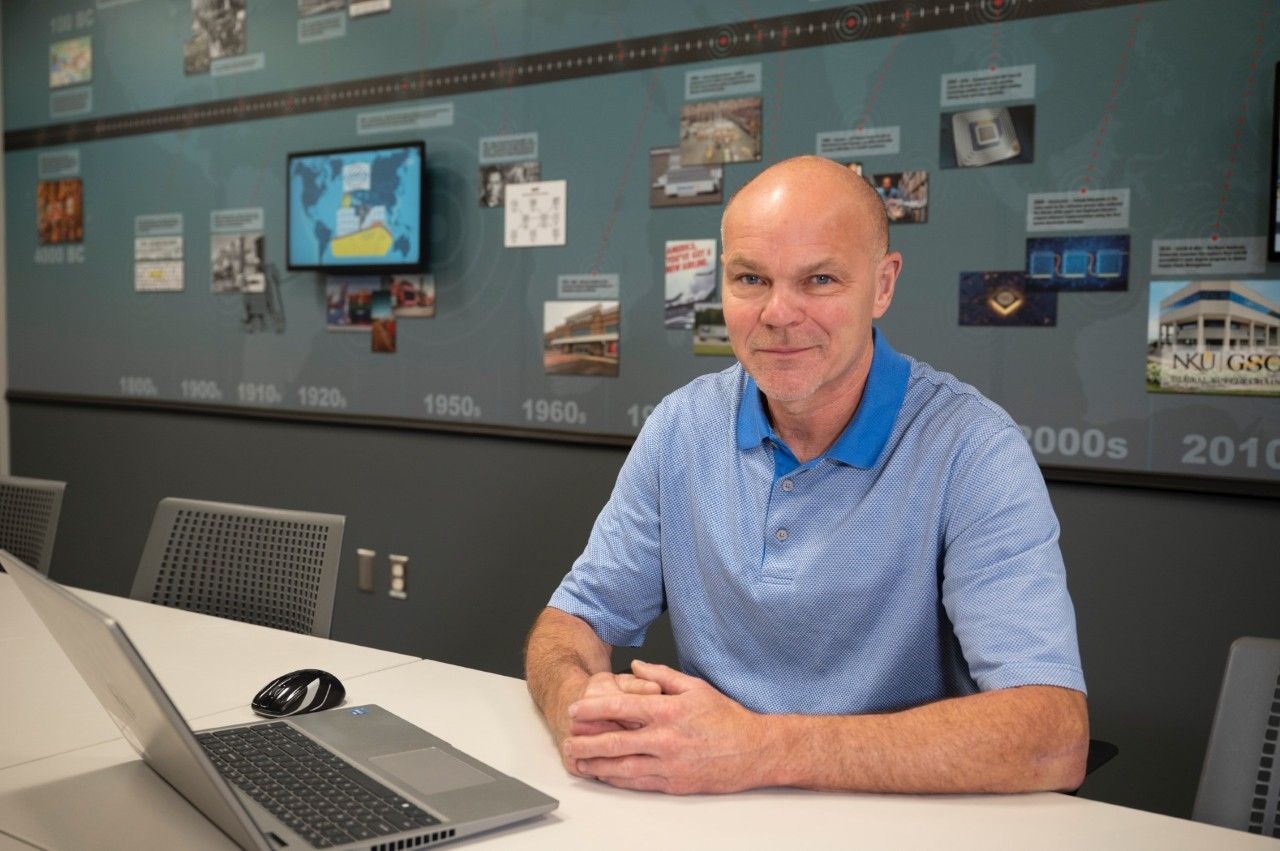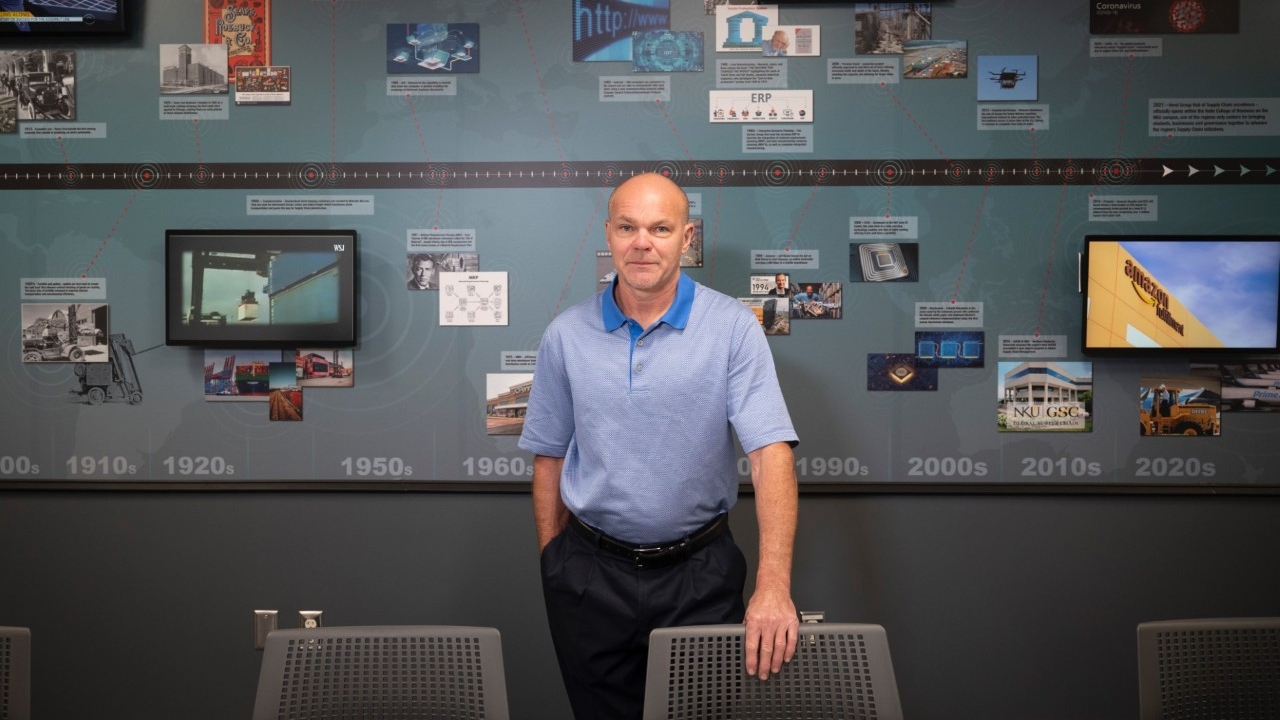
When Mark Thackeray was named the inaugural director of Northern Kentucky University’s newly founded Global Supply Chain Management degree track in 2017, he was tasked with building the program from the ground up. At the time, it consisted of little more than two students and a list of courses accredited by the Association to Advance Collegiate Schools of Business (AACSB). Six years later, the program has grown tenfold, encompassing more than 200 students, a minor, an MBA focus stack and a STEM-certified master’s degree in supply chain management, which will launch in the fall 2024 semester.
Offering the only four-year supply chain degree in the region, the program offers students the opportunity to attain hands-on experience with greater Cincinnati employers like Amazon, the Castellini Company, DHL and Verst Logistics, which Thackeray says has greatly contributed to the major’s success.
“This region is what we like to call the ‘supply chain Hollywood,’” Thackeray says. “We have tremendous access to business, and business has a tremendous access to our pipeline of talent. We’re setting our students up with a networking approach to have at least one, if not multiple job offers when they graduate, typically with a company that they've had some exposure to while they're here.”
“This region is what we like to call the supply chain Hollywood. We have tremendous access to business, and business has a tremendous access to our pipeline of talent."
He also believes that two other factors contribute to the program’s unique profile. The first is its emphasis on experiential learning. Students majoring in global supply chain management are encouraged to take on internships within related fields, which can count for up to six credits, and will also have the opportunity to take a 10-day trip to study the beverage and confectionery industry in the Netherlands. The experiential learning culminates with a 16-week, client-based capstone project in which students collaborate with a company on a real-world issue.
The second defining element of the supply chain management program is the access it offers students to their faculty.
“All of the professors in this program have some industry experience,” Thackeray says. “They are academics, meaning they do research, but they’re also practitioners. When they come into the classroom, they’re speaking from experience. That makes us unique from other schools, which offer a more predominantly research-based experience.”

Thackeray adds that while many people mistakenly think of the supply chain as being totally synonymous with logistics, the industry’s scope is much wider. Defining supply chain as “the connection and interaction of multiple steps from sourcing, to manufacturing, to warehousing to distribution taken to efficiently deliver a good or service to a customer,” his curriculum provides instruction and experience in each of these areas, while offering other topical courses like analytics and the aforementioned study abroad opportunity in Europe.
This comprehensive approach prepares students for a vast range of careers, post-graduation.
“I’ve had students go into procurement for Kroger and learn to be a category buyer, or they may go into analytics,” he says. “I had one student go to Verst Logistics as a process analytics person. I've had students go into network planning and scheduling. There was a recent graduate who went to Atlas Air, and part of their job is to look at all of the assets they own, which are principally pilots and airplanes, and then optimize the schedule to use those assets for customer demand.”
In 2022, the program also opened its Verst Group Logistics Hub of Supply Chain Excellence in the Business Academic Center, providing a central location for activities within the major. The space features a boardroom-style classroom where students attend lectures, an interactive history mural and a reference library. Additionally, the Hub is the home of NKU’s chapter of the Association for Supply Chain Management, which brings in regional business leaders and guest speakers.
“Two sessions ago, the topic was behind-the scenes-logistics of iconic Cincinnati events,” Thackeray says. “We had Thane Maynard from the Cincinnati Zoo talk about how they’re able to get the right plants for their animals, for example, and we also had Iris Simpson-Bush come in to talk about the logistics of the Flying Pig Marathon.”
Even students in the Haile College of Business who aren’t majoring in global supply chain management have a lot to learn from the track’s courses offered in the minor.
“That’s exactly why we designed it,” he says. “Let's say somebody wants to be in marketing or financial accounting. If they get the minor in supply chain, they broaden their exposure and horizons, which we believe makes them more valuable in the role that they're going to go into. With any degree we offer in the [Haile] College of Business, it's a way to give them broader exposure and make themselves more aware of what some of their counterparts are doing in the same firm or company they work with after graduation.”